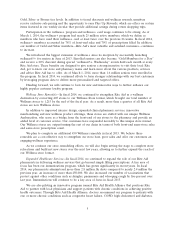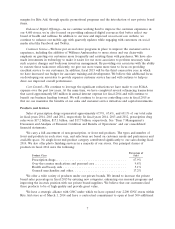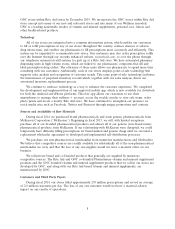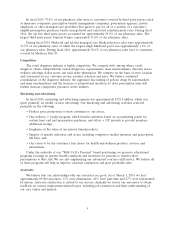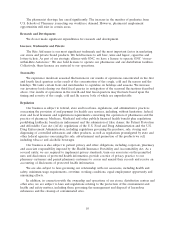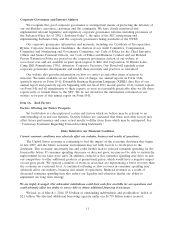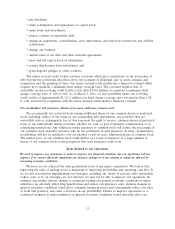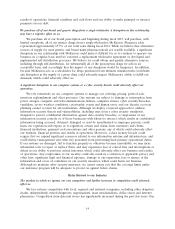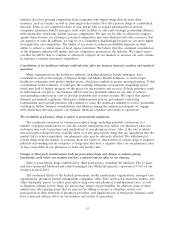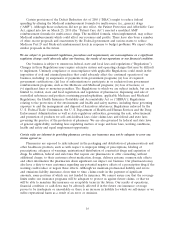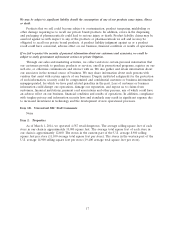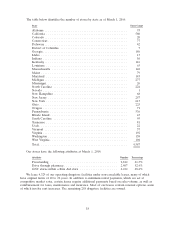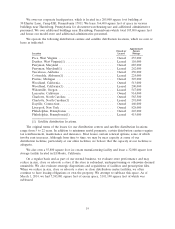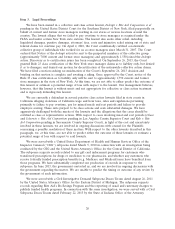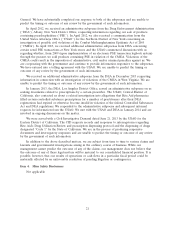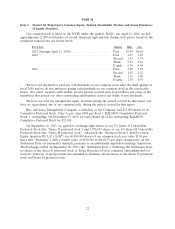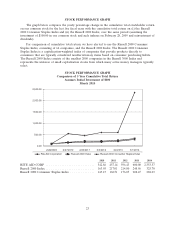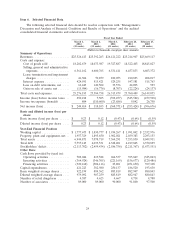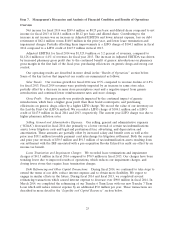Rite Aid 2014 Annual Report Download - page 16
Download and view the complete annual report
Please find page 16 of the 2014 Rite Aid annual report below. You can navigate through the pages in the report by either clicking on the pages listed below, or by using the keyword search tool below to find specific information within the annual report.industry also faces growing competition from companies who import drugs directly from other
countries, such as Canada, as well as from large-scale retailers that offer generic drugs at a substantial
discount. Some of our competitors have or may merge with or acquire pharmaceutical services
companies, pharmacy benefit managers, mail order facilities or enter into strategic partnership alliances
with wholesalers, which may further increase competition. We may not be able to effectively compete
against them because our existing or potential competitors may have financial and other resources that
are superior to ours. In addition, we may be at a competitive disadvantage because we are more highly
leveraged than our competitors. The ability of our stores to achieve profitability depends on their
ability to achieve a critical mass of loyal, repeat customers. We believe that the continued consolidation
of the drugstore industry will further increase competitive pressures in the industry. We cannot assure
you that we will be able to continue to effectively compete in our markets or increase our sales volume
in response to further increased competition.
Consolidation in the healthcare industry could adversely affect our business, financial condition and results of
operations.
Many organizations in the healthcare industry, including pharmacy benefit managers, have
consolidated, such as the merger of Express Scripts and Medco Health Solutions, to create larger
healthcare enterprises with greater market power, which has resulted in greater pricing pressures. If this
consolidation trend continues, it could give the resulting enterprises even greater bargaining power,
which may lead to further pressure on the prices for our products and services. If these pressures result
in reductions in our prices, our business will become less profitable unless we are able to achieve
corresponding reductions in costs or develop profitable new revenue streams. We expect that market
demand, government regulation, third-party reimbursement policies, government contracting
requirements, and societal pressures will continue to cause the healthcare industry to evolve, potentially
resulting in further business consolidations and alliances among the industry participants we engage
with, which may adversely impact our business, financial condition and results of operations.
The availability of pharmacy drugs is subject to governmental regulations.
The continued conversion of various prescription drugs, including potential conversions of a
number of popular medications, to over-the-counter medications may reduce our pharmacy sales and
customers may seek to purchase such medications at non-pharmacy stores. Also, if the rate at which
new prescription drugs become available slows or if new prescription drugs that are introduced into the
market fail to achieve popularity, our pharmacy sales may be adversely affected. The withdrawal of
certain drugs from the market or concerns about the safety or effectiveness of certain drugs or negative
publicity surrounding certain categories of drugs may also have a negative effect on our pharmacy sales
or may cause shifts in our pharmacy or front end product mix.
Changes in third party reimbursement levels for prescription drugs and changes in industry pricing
benchmarks could reduce our margins and have a material adverse effect on our business.
Sales of prescription drugs reimbursed by third party payors, including the Medicare Part D plans
and state sponsored Medicaid and related managed care Medicaid agencies, represented 97.0% of our
business in fiscal 2014.
The continued efforts of the Federal government, health maintenance organizations, managed care
organizations, pharmacy benefit management companies, other State and local government entities, and
other third-party payors to reduce prescription drug costs and pharmacy reimbursement rates, as well
as litigation relating to how drugs are priced, may impact our profitability. In addition, some of these
entities may offer pricing terms that we may not be willing to accept or otherwise restrict our
participation in their networks of pharmacy providers. Any significant loss of third-party business could
have a material adverse effect on our business and results of operations.
15


